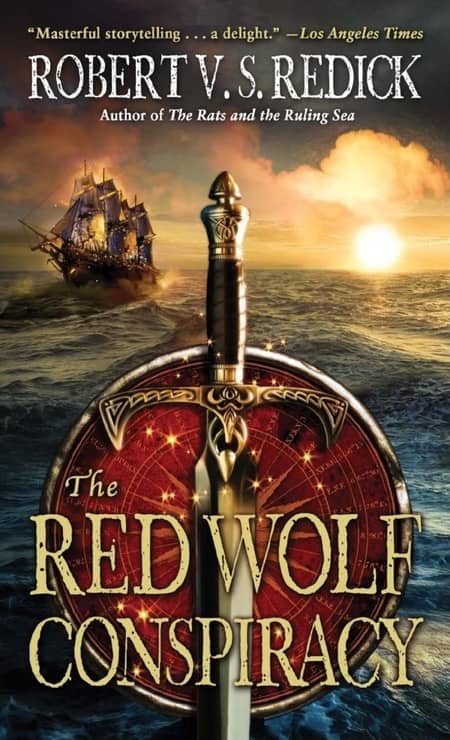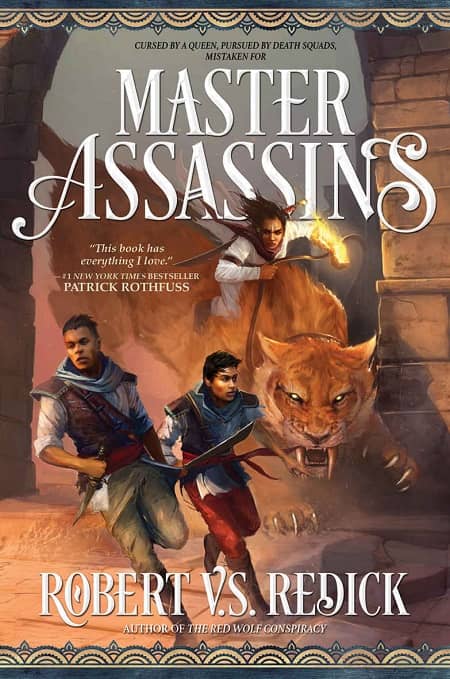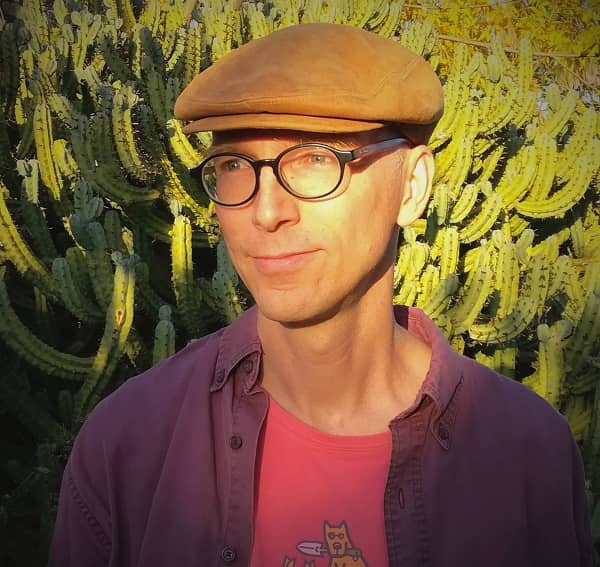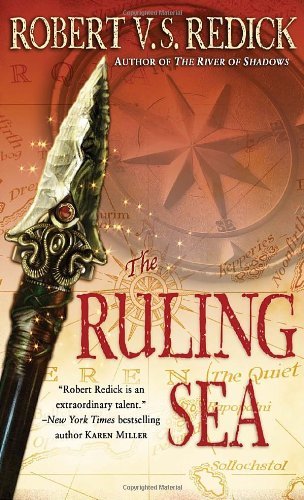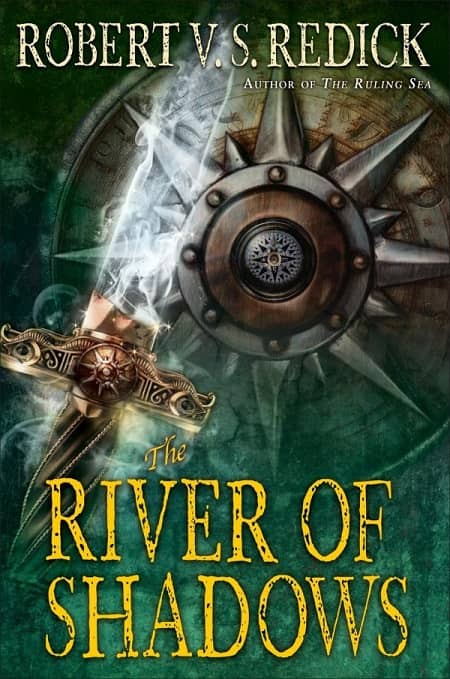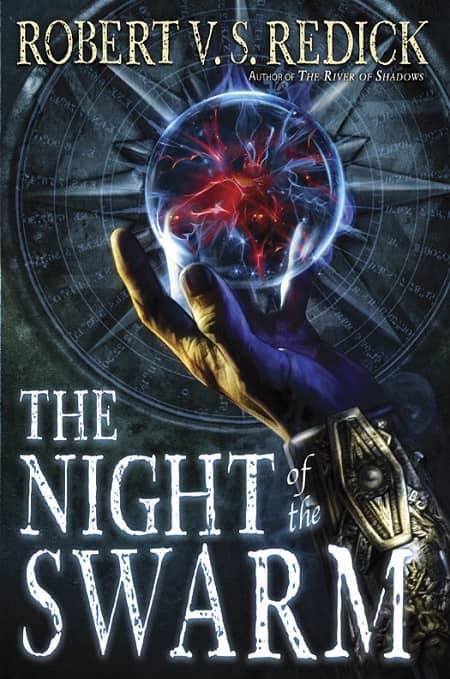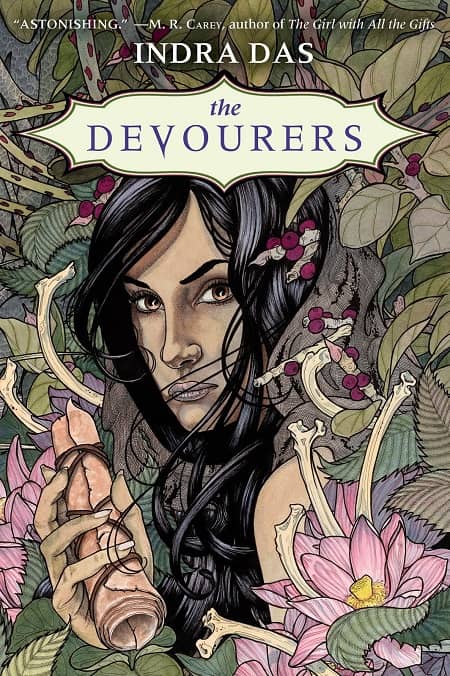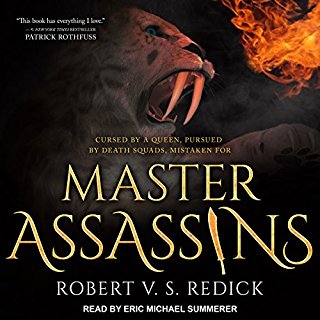Wrestling with Genre: Robert V. S. Redick on Master Assassins
AN INTRODUCTION
I think I stumbled on my first Robert V. S. Redick book in the Westerly Public Library. Oh, those Halcyon days where I wandered at whim through the SFF stacks, idly selecting titles and reading first pages. If they happened to catch my interest, well then! Together we went to the Self-Checkout, and thence for home — and blissful, blissful book-chomping time.
Is this how Red Wolf Conspiracy came to my hand? I seem to remember thinking, for whatever reason: “Probably not for me!”… and then, like two seconds later, it’s dawn of the third day, and my eyeballs are twitching, and I’ve just finished it.
At which point, knowing me, I probably friended him on Facebook.
[Click the images for bigger versions.]
That was early 2013. Facebook reminds me that I posted something about like his slang. “Blary,” to be specific: a combination of “bloody” and “very.” I was jealous of that slang, I admit it. I wanted to be like him when I grew up.
Fast forward five years. It’s February of 2018, in Boston, Massachusetts. And Carlos (husband) (professor) (writer) (game designer) and I got to meet Robert V. S. Redick at Boskone. Even better — Robert initiated the invitation! We’d all long since become Facebook buddies of a sort, you know, as happens on social media. But we’d never met in actual person.
And then, suddenly, right there in the hotel lobby, I discovered I had ANOTHER BROTHER! (I have five blood-related brothers, and about a half dozen of the other kind, so I know one when I see one.) And the three of us have one of those intimate con dinners in a noisy pub, where the talking starts immediately, and only regretfully winds down two hours later when the waitress starts giving us the hairy eyeball.
I definitely decided to go to his reading, right then and there. His new book, Master Assassins, was due out in a few weeks, and I thought to myself — somewhat dubiously (really, you’d think I’d’ve learned my lesson by now!), Well, I love Terry Pratchett’s assassins guild, anyway. And I do like movies about assassins, like Grosse Pointe Blank and Mr. and Mrs. Smith and Red. So. Assassins are… cool? It could be pretty okay, I guess.
Reader, I left Redick’s reading with the BACK OF MY SKULL BLOWN OUT!
I forthwith made Carlos (the darling) (the angel) (the beloved) BUY ME ROBERT’S BOOK. (Which he did.) (The cupcake.) And as soon as I could I cracked it. And then, two seconds later, it’s dawn of the third day, and my eyeballs are twitching, and I’ve just finished it.
So I decided to interview Robert V. S. Redick for your entertainment and elucidation. I really loved Master Assassins. It was nothing like what I expected. If I’d been a dinner table, Redick magicianed my cloth right out from under all the cutlery and crystal glasses. How the whole set-up trembled! I’d like to say nothing was shattered in the process… but MY BLEEDING HEART says I am a LIAR!
MY (UNOFFICIAL) SYNOPSIS
Master Assassins, book one of The Fire Sacraments, is the story of Kandri Hinjuman and his brother Mektu, both draftees in a holy war that they have no faith in. Kandri can pass for devout, but impulsive Mektu (possibly possessed by a demon) is like one big sore thumb jammed up the sphincter of the Prophet’s armed forces. One day, on the brink of being dispatched to a battle they have no hope of winning, the brothers find themselves in deep blackworm doodoo when one of the Prophet’s sons is killed and they are indicted as contract killers. What’s a fellow to do? Off they flee into the desert — the Land that Eats Men — where they meet warlords, child-soldiers, human traffickers, and GINORMOUS GAME-CHANGING SECRETS. All with sandcat-mounted death squads on their heels.
MY INTERVIEW WITH ROBERT V. S. REDICK
CSEC: Your narrative centers around the half-brothers Hinjumen, two soldiers in the Prophet’s army, and different as poet from engineer (hint: not so very different sometimes after all, and also, like, from two different planets!). Did Master Assassins start with two brothers in an awful situation, or did it start with the situation, or did the world come first and then the situation followed, populated at last by your main characters? Basically, what’s the origin story of your book?
RVSR: The story began with the brothers, facing death and impossible odds, caught up in a war without sense or meaning or mercy of any kind. They had only each other to rely on, ultimately — but their family history had mixed all kinds of pain and suspicion in with the love.
And that’s all I knew. Or at least, all I was conscious of. The story formed like rock candy around that string, and pretty soon I knew I was writing a book about an enchanted desert, a book about theocracy gone mad, and something of a written howl at the criminal stupidity of war.
And the brothers, Kandri and Mektu: they swam slowly into focus as well. Awful and outrageous as Mek can be, I think they’re both shot through with a lot of loveable qualities, and a great capacity for love themselves. And yet they’re forced to take part in a horrific conflict, with no qualities but waste and shame. It was through the lens of these two flawed, decent village boys that I was able to see the war, the torn land of Urrath, the whole world and its people.
But in another sense, this whole tale began as a wrestling match with my genre. Epic fantasy serves up a lot of violence: war, the aftermath of war, mass persecution of the weak by the strong. Sometimes it’s handled brilliantly. Sometimes it’s rendered as a D&D romp — the kind of thing I spent half my waking hours playing at as a kid.
Violence, of course, is never a romp. Violence leaves no one jolly or unscarred. In Master Assassins I did my best to raise the game where violence was concerned — not by out-grimming the Grimdark writers, but by showing bloodshed for what it is: a terrible debasement, a blasting of hopes. I particularly wanted to take seriously what violence does to the mind — of the victims and the perpetrators.
And then Mektu laughed in my face. “Fine,” he said. “War, whatever. How about what war does to clowns and artists, people put on this earth to shake you losers up? Do you think we just fold? Hell no. We don’t go down without a fight.” And right there, the tale became something larger and more challenging.
Why brothers? And, if we come to that, let’s talk about the past/present alternating structure of the story, the latter of which centers around family and several great mysteries that fuel the engine of the narrative?
I have no birth-brother, but I’ve definitely had a couple of Mektus in my life: friends who were brilliant, funny, infuriating, deranged, dangerous — all at the same time. And when you’ve been close to people like that, how can you not write about them?
As for the leaping between past and present, that really struck me as the natural way to tell the story. Kandri, the sane and steady brother, is doomed to tell this story, if you like. And his telling is at the same time his own journey into understanding it. And there is no understanding of a relationship without the history of that relationship.
The White Child is terrifying. Tell us about “building your monsters.” What scares you most and how do you make it walk and talk for us, your faithful and devoted readers?
Oh, the White Child. I did have a great time with her. But very much like Mektu, she just… walked into the book. I did not see her coming. I did not know what she was. And I think honestly that’s why she works as well as she does: because I was terrified of her in a way that you can only be terrified of the unknown. To your larger question about monsters: yes, I love them inordinately. I love how they reveal the vastness, deadliness, and strangeness of creation. I love what my characters do when confronted with them. I love how the most interesting monsters leap back and forth across the line we draw between good and evil, blurring it with a brush of their tails each time they do so.
Tell us some of the MOST FUN EVER you had writing a scene. Why? Are scenes you have fun writing ones you tend to read aloud most later?
Oh man, these questions are so good, and so hard! I once wrote a scene where a rich, vile, violent pig farmer compels a consumptive music student to wade thigh-deep into pig shit, hoist the huge farmer on his shoulders, and wade out again, passing very close to a small rabid dog. I had quite literally dreamed that scene the night before. Everything about it was frightening and outrageous, and that made it really fun to write. But in master assassin’s, the scene I enjoyed writing the most (and I’ll put on my spoiler-control hat here) involves a powerful antagonist torturing our brother-heroes before a crowd as a kind of sick entertainment, until the moment he reads something in a letter that transforms them before the eyes of all into an ally. That was exciting to write.
What’s next for you? What are you working on now? Give us a sneak peak? A sentence you are SUPER PROUD OF?
What’s next is Sidewinders! Book II in this trilogy is really different. The brothers and their family remain at the center, but the world enlarges around them massively. It’s not just that the Great Desert of Urrath swallows them whole (it does), but that we get to know others, in very distant parts of Urrath, whose lives are on a collision-course with their own. Also, the Quarantine comes into greater focus, and the deeply evil forces involved with it. And all of it’s moving towards the last book and its epochal conflict. There’s a reason the trilogy ends with a novel called Siege.
As for that weird second title — well, Sidewinders should make a lot of sense once you get to Book II, just as Master Assassins makes sense by the time you finish Book I. Are our heroes really assassins? No… but in another sense, absolutely. Likewise, do they really have much in common with the strangest of rattlesnakes? Wait and see (he says with a flourish).
A taste of Sidewinders? You bet. These lines are near the beginning:
The pit had appalled him even before he learned what it contained. From the plateau above it was merely a round hole in the earth, but as they descended it took on a quality of menace. Broad, black, dry as a desert tomb. Here on the canyon floor it gaped at him, promising nothing but disaster, a chill wind moaning across its mouth. He had no wish to approach it. Who in their right mind would?
Fun and games, as always.
Any books (other than yours because OF COURSE YOURS) you’ve been enjoying we should keep an eye out for? Pieces of music that inspired you? Do you have any rituals of artistic replenishment you return to as a touchstone of inspiration?
I’ve been a border-jumper since childhood. When I need replenishment, I mostly try to look beyond the zone of the too-familiar, to find a place or a story or a voice that stirs up the thrill of discovery once again. This certainly holds true for what I read. A genre novel I think should be far better known is Indra Das’ The Devourers, about shapeshifters in India from the last Moghul emperors to today. It is not for the faint of heart — these creatures eat people, lots of them — but the story’s excellent and the writing will take your breath away. Equally beautiful but utterly different is Thanishk Tharoor’s collection Swimmer Among the Stars. Some of the stories are science fiction; others closer to slipstream or surreal literary, but all of them have a fierce and lyric brilliance that makes them linger in one’s mind.
THE EXCERPT . . .
WARNING: IT WILL MAKE YOU WANT TO SPIT!
Setting: Eternity Camp, a military base for 30,000 peasant soldiers, and the center of the Prophet’s war effort: her jails, workshops, laboratories, torture chambers. Kandri Hinjuman, a 24-year-old draftee, has come to see his uncle the weapon’s smith about his, Kandri’s, impossibly reckless brother Mektu. But he has found his uncle guarding a precious knife belonging to the Prophet’s favorite son.
Just past midnight a team of soldiers comes for the knife. They are led by Ojulan’s deputy, a ferocious officer named Idaru. A colonel and a terror in his own right, Idaru stands six foot ten. On his cheeks are the ritual burns of the Mesurat clan: spirals that look as if they were made with heated wire. He storms up to Kandri and screams in his face: what in Jekka’s hell are you doing here, who are you to gaze at the Prophet’s gift to Lord Ojulan, were you planning to steal it, you dog?
Kandri’s uncle lifts his hands. “I asked him to be here, Colonel. I didn’t know what was happening. Lord Ojulan told me he’d be back within the hour.”
“Lord Ojulan is” — Idaru stammers — “busy, detained. Lord Ojulan has a thousand cares!”
“Yes, sir. And I knew Corporal Hinjuman would fight to protect his property, just as I would. He’s like a son to me, sir.”
The colonel’s nostrils flare. “That is good, then. That is excellent. Why did you not speak up for yourself, Hinjuman? The Prophet requires boldness of her men.”
Kandri promises, with great contrition, to be bold.
“See that you are.” Idaru’s eyes shift to Chindilan. “Your man here could be out drinking and fornicating, smith, but instead he is here with you, guarding the Thirdborn’s property. I am pleased with you, Hinjuman.”
“Thank you, Colonel,” says Kandri.
“Your breath is somewhat foul, however. Do you brush your teeth?”
“Twice daily, sir.”
“Show me.”
Kandri opens wide. Before he knows what is happening, the colonel’s hand is in his mouth.
“Close gently. That’s right.”
The colonel withdraws his hand. Kandri stiffens: Idaru has placed an object in the pouch of his cheek. And his men, all of them, have aimed their spears in his direction.
“Speak through your teeth,” says the colonel. “Don’t move your jaw until I say so. Your life depends on your obedience.”
Sweat breaks out all over Kandri’s body. The thing in his mouth is light and brittle, like a hollow egg. A hint of sugar teases his tongue.
“Colonel, what in Ang’s name —” Chindilan starts forward, but Idaru’s look stops him cold.
“Keep still,” he says. “This is no punishment. Corporal Hinjuman is among the first to be honored with this chance to prove his loyalty. And to place a new tool in the arsenal of the Prophet. We hope to use this test often in the future — if all goes well.”
The new test, Kandri thinks. It’s real. Ang all-merciful, I’m going to die.
“There is an insect in your mouth,” says the colonel. “Or more precisely, a chrysalis. The vermin itself is dormant, but the warmth of your blood will change that. Any moment now —”
Kandri gives a distorted cry. Something has twitched inside the shell.
“Do not touch your cheek!” snaps Idaru. “Stop that shaking at once.”
“I’m loyal,” Kandri pleads through locked teeth. “I love the Prophet, her feet walk Heaven’s —”
“The insect is an ash locust,” says the colonel. “It has neither bite nor sting. But the fluid inside the chrysalis is a contact poison. Should it touch your flesh, you will be paralyzed. First your facial muscles, then your throat. Eventually, your lungs and heart.”
Kandri starts to plead again, but the colonel silences him with a gesture. “If you are loyal, you have nothing to fear. The chrysalis alone is almost too fragile to touch, but we have glazed it with another substance. A rather extraordinary substance: a sugar that dissolves more quickly in a liar’s mouth than that of an honest man. Do you follow? Speak falsely, and the shell will rupture before I finish my questions. Speak the truth and live.”
Kandri stares at the colonel, rigid with horror. He can distinctly taste the sugar now. His uncle’s chest is heaving, his big hands forming fists.
“Kandri Hinjuman,” says Idaru, “are you a loving servant of Her Radiance the Prophet? A nod will suffice.”
Suffice to kill me? He cannot help the thought. He dares not hesitate. He nods.
The locust twitches, and so does Kandri — every part of him, save his face. “And are you a willing soldier in this war?” asks Idaru.
Sweetness coats Kandri’s tongue, but in his mind a strange cold has descended. Is he willing? Is any part of him still true?
He nods. The locust is squirming violently, now; the shell quivers and jumps.
“Colonel Idaru,” pleads Chindilan. “This is a flawless soldier you’re experimenting on. He nearly met his death in the Ghalsúnay campaign. He had an audience with the Prophet herself. He’s one of us. I’ll stake my life on that.”
The colonel turns to Chindilan with deliberate slowness. “If you value him so, why delay me with these outbursts? You may doom an innocent man—if he is innocent.”
Another extravagant pause. At, last his sharp gaze returns to Kandri.
“One more question,” he says. “Is there any person in this camp — anyone at all — whose loyalty you doubt?”
Kandri closes his eyes, and in the darkness, Mektu’s face appears like a sallow bloom. His crooked grin, his provocations, his hopeless dreams of escape. The insect writhes; the shell bulges. He shakes his head.
“Spit it out!” snaps the colonel.
Kandri doubles over. The chrysalis drops from his mouth, slick and translucent. Even as it strikes the dirt it ruptures, and a barbed, black leg twitches free. Then it’s gone, crushed by the colonel’s boot. Idaru sets a hand on Kandri’s arm.
“Rejoice,” he says. “This too is part of winning the war. You have both faith and courage — and from this moment, no one may question them. Our Prophet shall hear of your strength today, Corporal Hinjuman. That’s a promise.”
